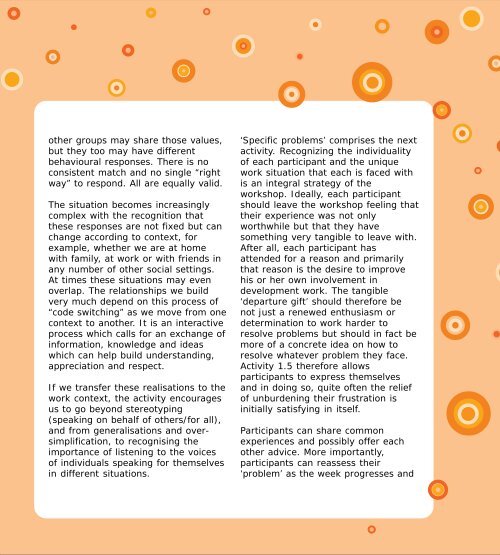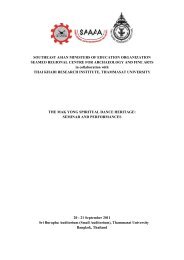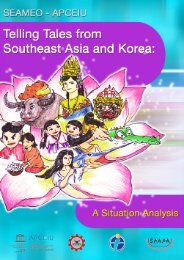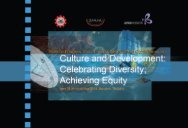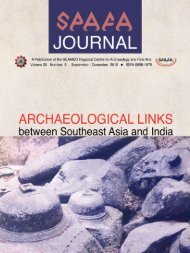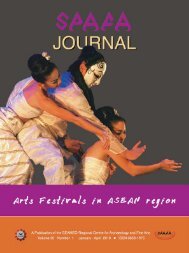on Culture & Development - Seameo-SPAFA
on Culture & Development - Seameo-SPAFA
on Culture & Development - Seameo-SPAFA
- No tags were found...
Create successful ePaper yourself
Turn your PDF publications into a flip-book with our unique Google optimized e-Paper software.
36other groups may share those values,but they too may have differentbehavioural resp<strong>on</strong>ses. There is noc<strong>on</strong>sistent match and no single “rightway” to resp<strong>on</strong>d. All are equally valid.The situati<strong>on</strong> becomes increasinglycomplex with the recogniti<strong>on</strong> thatthese resp<strong>on</strong>ses are not fixed but canchange according to c<strong>on</strong>text, forexample, whether we are at homewith family, at work or with friends inany number of other social settings.At times these situati<strong>on</strong>s may evenoverlap. The relati<strong>on</strong>ships we buildvery much depend <strong>on</strong> this process of“code switching” as we move from <strong>on</strong>ec<strong>on</strong>text to another. It is an interactiveprocess which calls for an exchange ofinformati<strong>on</strong>, knowledge and ideaswhich can help build understanding,appreciati<strong>on</strong> and respect.If we transfer these realisati<strong>on</strong>s to thework c<strong>on</strong>text, the activity encouragesus to go bey<strong>on</strong>d stereotyping(speaking <strong>on</strong> behalf of others/for all),and from generalisati<strong>on</strong>s and oversimplificati<strong>on</strong>,to recognising theimportance of listening to the voicesof individuals speaking for themselvesin different situati<strong>on</strong>s.‘Specific problems’ comprises the nextactivity. Recognizing the individualityof each participant and the uniquework situati<strong>on</strong> that each is faced withis an integral strategy of theworkshop. Ideally, each participantshould leave the workshop feeling thattheir experience was not <strong>on</strong>lyworthwhile but that they havesomething very tangible to leave with.After all, each participant hasattended for a reas<strong>on</strong> and primarilythat reas<strong>on</strong> is the desire to improvehis or her own involvement indevelopment work. The tangible‘departure gift’ should therefore benot just a renewed enthusiasm ordeterminati<strong>on</strong> to work harder toresolve problems but should in fact bemore of a c<strong>on</strong>crete idea <strong>on</strong> how toresolve whatever problem they face.Activity 1.5 therefore allowsparticipants to express themselvesand in doing so, quite often the reliefof unburdening their frustrati<strong>on</strong> isinitially satisfying in itself.Participants can share comm<strong>on</strong>experiences and possibly offer eachother advice. More importantly,participants can reassess their‘problem’ as the week progresses and


